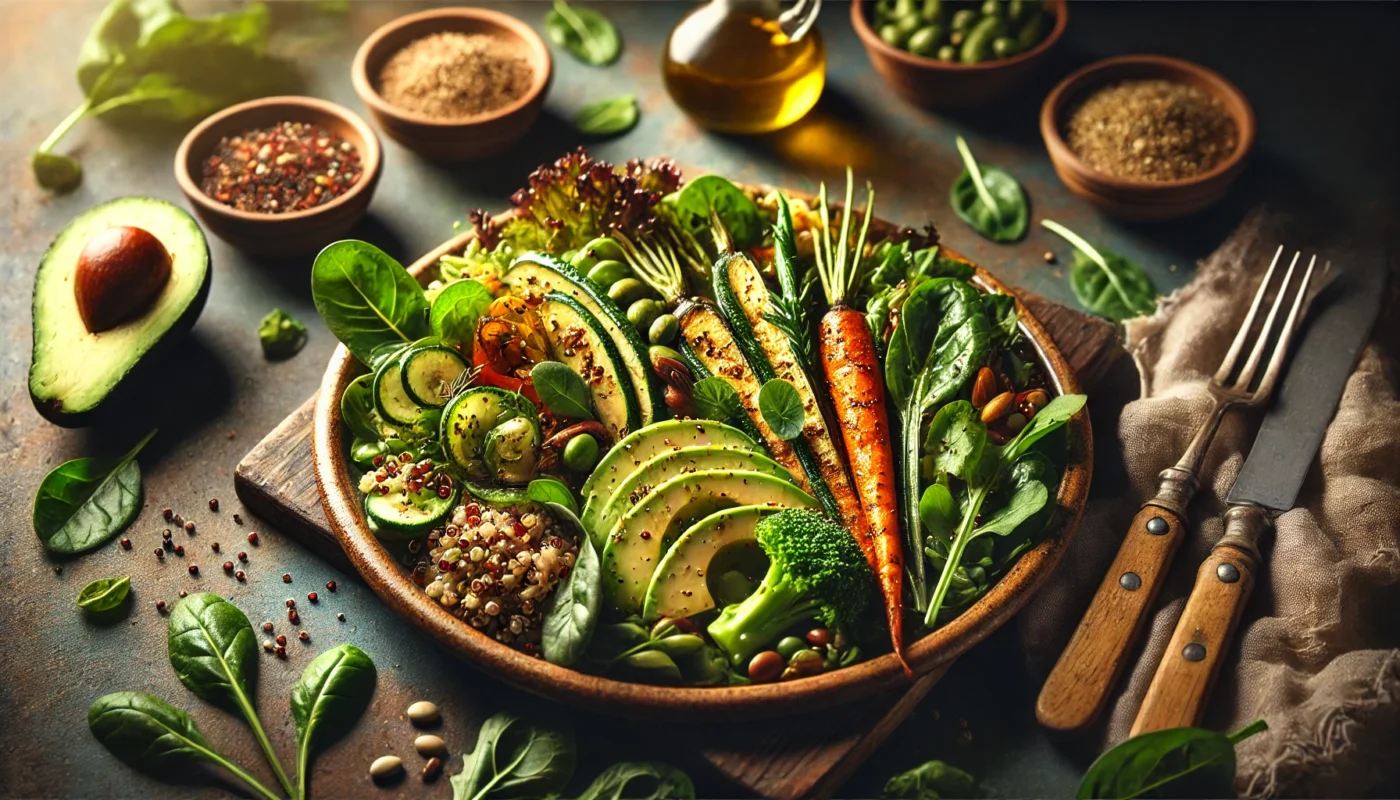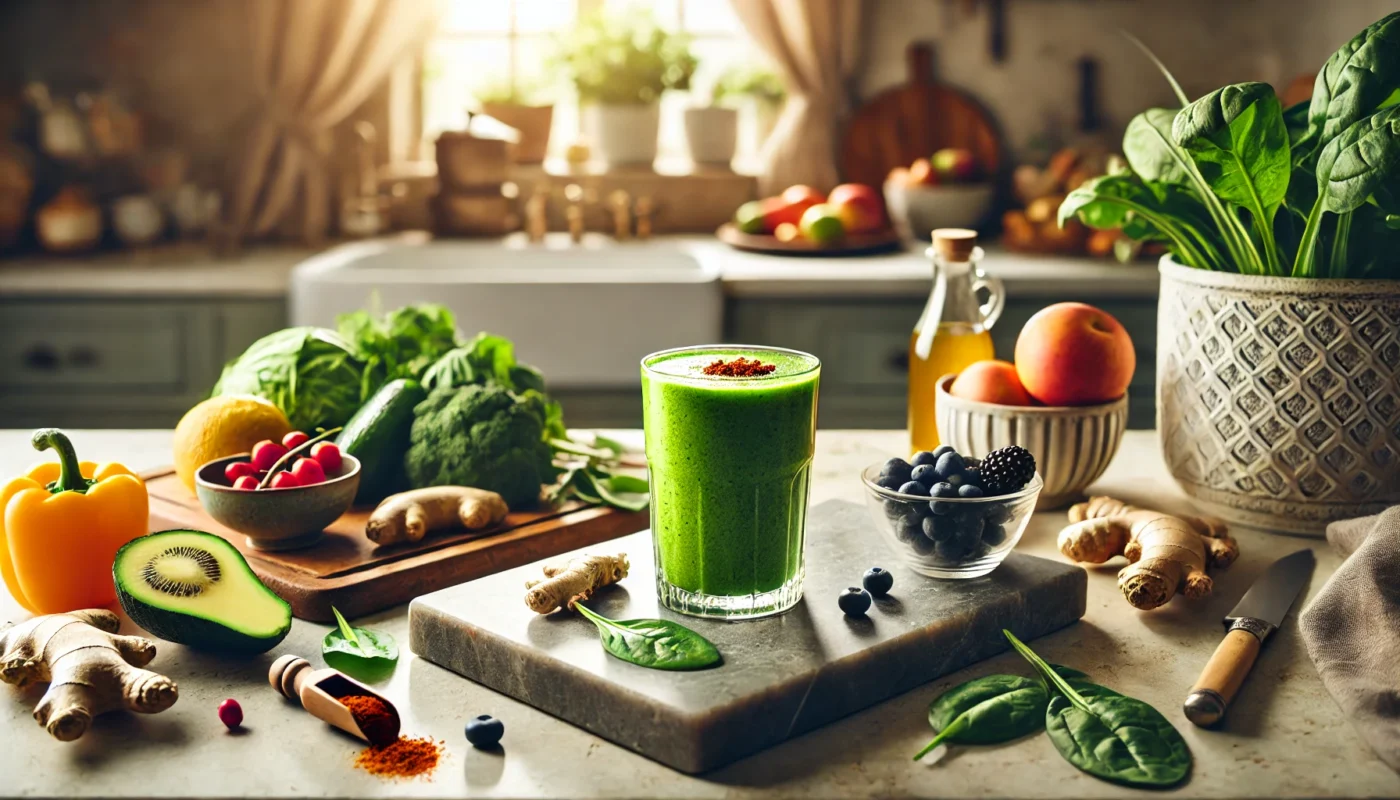In this article, we will delve into the benefits of a vegan anti-inflammatory diet, explore some practical strategies for its implementation, and provide insights into how it can enhance your overall well-being.
You may also like: 20 Powerful Anti-Inflammatory Foods
Understanding Inflammation and Its Impact on Health
The Dual Nature of Inflammation
Inflammation is the body’s natural response to injury or infection, and it plays a dual role. Acute inflammation is beneficial, helping to heal wounds and fight off infections quickly. However, when inflammation becomes chronic, it can wreak havoc on the body, leading to a host of diseases. Understanding this dual nature is crucial in recognizing why managing inflammation is essential for health.
Chronic Inflammation: The Silent Assailant
Unlike acute inflammation, chronic inflammation can persist quietly for months or even years, often going unnoticed until significant damage has occurred. It is a known contributor to various chronic illnesses, such as heart disease, arthritis, and certain cancers. The subtlety of chronic inflammation is what makes it particularly dangerous, as it can remain undetected until substantial harm has been done.
The Modern Diet’s Role in Inflammation
The modern diet, characterized by high consumption of processed foods, sugars, and animal products, is a significant contributor to chronic inflammation. These foods can exacerbate inflammatory processes, making dietary intervention a crucial strategy in managing inflammation. Transitioning to a diet rich in anti-inflammatory foods can help counteract these effects and promote better health outcomes.
Key Components of a Vegan Anti-Inflammatory Diet
Emphasizing Whole Foods
The cornerstone of a vegan anti-inflammatory diet is the consumption of whole, minimally processed foods. These foods are dense in nutrients and free from the additives and preservatives that often accompany processed foods. Emphasizing whole foods helps ensure that you are consuming the maximum amount of beneficial nutrients to combat inflammation.
Fruits and Vegetables
Fruits and vegetables are the stars of the show when it comes to fighting inflammation. Berries, with their high antioxidant content, and leafy greens, rich in vitamins and minerals, are particularly potent. Cruciferous vegetables like broccoli and Brussels sprouts contain compounds known to reduce inflammation and improve overall health.
Whole Grains
Whole grains such as quinoa, brown rice, and oats are not only excellent sources of fiber but also provide essential nutrients that support gut health. A healthy gut is closely linked to a reduction in inflammation, making these grains a vital component of the diet.
Nuts and Seeds
Nuts and seeds like almonds, walnuts, chia seeds, and flaxseeds are powerhouses of omega-3 fatty acids. These fatty acids are known for their anti-inflammatory properties and support overall cardiovascular health, making them an essential part of the diet.
Incorporating Anti-Inflammatory Spices
Spices such as turmeric, ginger, and cinnamon are not only flavorful but also boast impressive anti-inflammatory effects. Incorporating these spices into your meals can enhance the anti-inflammatory potential of your diet.
Turmeric and Curcumin
Turmeric, with its active compound curcumin, has been extensively studied for its ability to reduce inflammation and promote joint health. It can be added to a variety of dishes, from curries to smoothies, making it a versatile spice for any vegan anti-inflammatory diet.
Ginger’s Soothing Properties
Ginger is another potent anti-inflammatory spice that can be used fresh, dried, or in powder form. Known for its soothing properties, ginger can help alleviate symptoms of inflammation, making it a staple in many anti-inflammatory recipes.
Cinnamon: More Than a Sweetener
Cinnamon, often associated with sweet dishes, is a powerful anti-inflammatory agent. Its ability to improve insulin sensitivity and reduce inflammation makes it a valuable addition to both sweet and savory dishes.
Prioritizing Healthy Fats
While a vegan diet eliminates animal fats, it can still be rich in healthy fats from sources like avocados, olive oil, and nuts. These fats support cardiovascular health and help regulate inflammatory responses in the body.
Avocados: Nature’s Butter
Avocados are rich in monounsaturated fats, which are heart-healthy and help to reduce inflammation. They can be added to salads, smoothies, or eaten on their own, providing versatility and nutrition.

Olive Oil: The Mediterranean Secret
Olive oil, a staple of the Mediterranean diet, is known for its high content of oleic acid, a healthy fat that reduces inflammation. Using olive oil as a primary cooking oil can significantly enhance the anti-inflammatory benefits of your diet.
Nuts as Nutrient-Dense Snacks
In addition to being rich in omega-3s, nuts provide a wealth of other nutrients, including protein and fiber. Snacking on a handful of nuts or incorporating them into meals can provide a satisfying and nutritious boost to your diet.
Practical Strategies for Transitioning to a Vegan Anti-Inflammatory Diet
Gradual Implementation
Transitioning to a vegan anti-inflammatory diet doesn’t have to be an overnight shift. Gradually replacing animal products with plant-based alternatives can make the process more manageable.
Starting with Small Changes
Begin by incorporating more fruits and vegetables into your meals and exploring plant-based protein sources such as lentils, chickpeas, and tofu. These small changes can pave the way for a smoother transition to a fully vegan diet.
Exploring Plant-Based Alternatives
There are numerous plant-based alternatives available for traditional animal products. From plant-based milks to meat substitutes, experimenting with these options can help ease the transition and keep meals exciting.
Building a Supportive Environment
Having a supportive environment can make transitioning easier. Engaging family and friends in your journey, finding community support groups, and seeking out vegan-friendly restaurants can all contribute to a successful transition.
Exploring Anti-Inflammatory Recipes
Experimenting with new recipes can make the transition enjoyable and sustainable. Websites and cookbooks dedicated to vegan and anti-inflammatory diets offer a wealth of ideas that cater to diverse tastes and preferences.
Discovering Diverse Cuisines
Exploring cuisines from around the world can introduce a variety of flavors and ingredients that are both vegan and anti-inflammatory. From Indian curries to Mediterranean dishes, there is a wealth of delicious options to discover.
Creating Meal Plans
Creating meal plans can help ensure that you are consuming a balanced diet and make grocery shopping more efficient. Meal planning can also help reduce the stress of daily meal preparation, making it easier to stick to your diet.
Sharing Meals with Others
Sharing meals with family and friends can make the transition more enjoyable. Hosting potlucks or cooking together can provide opportunities to try new recipes and share the benefits of a vegan anti-inflammatory diet with others.
Mindful Eating
Adopting a vegan anti-inflammatory diet also involves embracing mindful eating practices. Paying attention to hunger cues, savoring each bite, and choosing nutrient-dense foods can enhance your relationship with food and promote overall well-being.
Recognizing Hunger and Fullness
Learning to recognize true hunger and fullness cues can prevent overeating and help maintain a healthy weight. Mindful eating encourages listening to your body and eating only when truly hungry.
Savoring Each Bite
Taking the time to savor each bite can enhance the eating experience and improve digestion. Mindful eating involves slowing down, appreciating the flavors and textures of food, and fostering a deeper connection with the act of eating.
Choosing Nutrient-Dense Foods
Focusing on nutrient-dense foods ensures that you are getting the most nutrition out of every meal. This approach supports overall health and well-being, making it a key component of a vegan anti-inflammatory diet.
Scientific Insights into the Benefits of a Vegan Anti-Inflammatory Diet
Reduction in Inflammatory Markers
Research supports the efficacy of a vegan anti-inflammatory diet in reducing markers of inflammation and improving health outcomes. A study published in the journal Nutrients found that participants following a plant-based diet experienced significant reductions in C-reactive protein (CRP), a key marker of inflammation.
Understanding C-Reactive Protein (CRP)
CRP is a protein produced by the liver in response to inflammation. High levels of CRP in the blood are indicative of acute or chronic inflammation, making it a valuable marker for assessing inflammation levels in the body.
The Role of Plant-Based Diets
Plant-based diets are naturally lower in inflammatory foods and higher in anti-inflammatory nutrients. This balance contributes to the reduction of CRP levels, supporting overall health and reducing the risk of chronic diseases.
Long-Term Health Benefits
The long-term health benefits of reduced inflammation include a lower risk of chronic diseases such as type 2 diabetes, cardiovascular disease, and certain cancers. By adopting a vegan anti-inflammatory diet, you can significantly improve your health and longevity.
Association with Reduced Disease Risk
In addition to reducing inflammation, plant-based diets have been associated with lower risks of chronic diseases such as type 2 diabetes, cardiovascular disease, and certain cancers.
Type 2 Diabetes and Insulin Sensitivity
A vegan anti-inflammatory diet can improve insulin sensitivity and reduce the risk of developing type 2 diabetes. The high fiber content of plant-based foods helps regulate blood sugar levels, promoting better metabolic health.

Cardiovascular Health
The heart-healthy fats and antioxidants found in plant-based foods support cardiovascular health. By reducing inflammation and improving lipid profiles, a vegan anti-inflammatory diet can significantly lower the risk of heart disease.
Cancer Prevention
Certain cancers have been linked to chronic inflammation. A diet rich in anti-inflammatory foods can help reduce the risk of cancer by minimizing inflammation and supporting the body’s natural defense mechanisms.
Addressing Common Concerns
Nutrient Adequacy
One common concern about a vegan diet is nutrient adequacy, particularly regarding protein, vitamin B12, iron, and omega-3 fatty acids. However, with careful planning, a vegan anti-inflammatory diet can provide all necessary nutrients.
Protein Sources
Plant-based proteins are abundant and include lentils, chickpeas, tofu, tempeh, and quinoa. These foods provide essential amino acids and can easily meet protein needs without animal products.
Vitamin B12 and Iron
Vitamin B12 and iron are critical nutrients that require attention in a vegan diet. Fortified foods and supplements can ensure adequate intake, while consuming iron-rich foods like spinach and legumes can support iron levels.
Omega-3 Fatty Acids
Omega-3 fatty acids are vital for reducing inflammation and supporting brain health. Chia seeds, flaxseeds, and walnuts are excellent plant-based sources, and algae-based supplements can provide additional support.
Personalized Approach
It’s important to recognize that dietary needs vary among individuals. Consulting with a healthcare professional or registered dietitian can help tailor a vegan anti-inflammatory diet to your specific health goals and requirements.
Individual Health Goals
Everyone’s health goals are unique, and a personalized diet can help achieve them more effectively. Working with a professional ensures that your diet supports your specific needs and lifestyle.
Managing Health Conditions
Certain health conditions may require specific dietary adjustments. A healthcare professional can provide guidance on how to modify a vegan anti-inflammatory diet to manage conditions like diabetes or digestive disorders.
Continuous Evaluation
Regularly evaluating your diet and health can help identify any areas that need adjustment. Continuous monitoring ensures that your diet remains aligned with your health goals and provides optimal benefits.

Conclusion: The Path to Enhanced Well-Being
A vegan anti-inflammatory diet offers a holistic approach to health, addressing inflammation at its root and promoting overall wellness. By focusing on nutrient-dense, plant-based foods and incorporating anti-inflammatory strategies, you can harness the power of nutrition to support your body’s natural healing processes.
Whether you’re a fitness enthusiast seeking optimal recovery, a health enthusiast aiming to optimize well-being, or a medical patient managing chronic conditions, a vegan anti-inflammatory diet can be a valuable tool in your wellness journey. Embrace the benefits of plant-based eating and experience the transformative impact it can have on your health and vitality.
Embracing a Healthier Lifestyle
Transitioning to a vegan anti-inflammatory diet is more than just a dietary change; it’s a commitment to a healthier lifestyle. By making mindful food choices, you can improve your health, enhance your quality of life, and contribute to a more sustainable world.
The Power of Plant-Based Nutrition
Plant-based nutrition offers a powerful tool for combating inflammation and promoting health. By incorporating a variety of colorful, whole foods into your diet, you can enjoy the numerous benefits of plant-based eating.
The Journey to Wellness
Embarking on a vegan anti-inflammatory diet is a journey towards enhanced well-being. With dedication and mindfulness, you can achieve a healthier, more vibrant life and inspire others to join you on this path to wellness.
Further Reading:
How to Reduce Inflammation with a Plant-Based Diet
CRP, inflammation, plant-based diet, anti-inflammatory, chronic diseases, type 2 diabetes, cardiovascular health, cancer prevention, nutrient adequacy, vegan diet, protein sources, vitamin B12, iron, omega-3 fatty acids, personalized diet, health goals, managing health conditions, wellness, plant-based nutrition, healthy lifestyle
Important Note: The information contained in this article is for general informational purposes only, and should not be construed as health or medical advice, nor is it intended to diagnose, prevent, treat, or cure any disease or health condition. Before embarking on any diet, fitness regimen, or program of nutritional supplementation, it is advisable to consult your healthcare professional in order to determine its safety and probable efficacy in terms of your individual state of health.
Regarding Nutritional Supplements Or Other Non-Prescription Health Products: If any nutritional supplements or other non-prescription health products are mentioned in the foregoing article, any claims or statements made about them have not been evaluated by the U.S. Food and Drug Administration, and such nutritional supplements or other health products are not intended to diagnose, treat, cure, or prevent any disease

